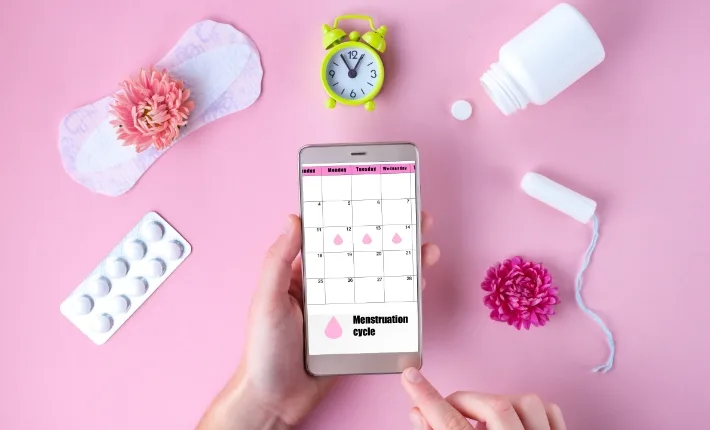Ovulation and Mood Swings: Understanding Emotional Changes & How to Cope

Ovulation is an integral phase in the menstrual cycle that occurs when a mature egg is released into the ovary. Since this cycle is a symphony of hormones, each phase lends a hand to diverse changes that prepare the body for a potential pregnancy. However, these changes are not limited physiologically but go beyond them, translating into a large impact on an individual's emotional state as well. Such fluctuations in mood swings while ovulating can affect their emotional well-being in their daily lives. Hence, understanding the intricate relationship between ovulation symptoms and mood swings is essential. These may help you manage your mental health better and ensure a better quality of life.
What are the Symptoms and Mood changes during Ovulation?
As mentioned above, ovulation brings about several changes in a woman's health. This is due to shifts in hormone levels to support the healthy functioning of the menstrual cycle. Their impact may manifest in physical and emotional ovulation symptoms and moods which may vary across individuals.
Physically, ovulating women may experience:
- Breast tenderness
- Bloating
- Basal Body Temperature fluctuations
- Changes in Cervical mucus
- Pelvic pain
- Increased libido
Such physical indicators are often used by women to track their ovulation period, which helps in better fertility planning. However, the emotional symptoms during ovulation can be just as significant to an individual's well-being, albeit less predictable.
Commonly, emotional symptoms1 during ovulation may include:
- Anxiety
- Sadness
- Irritability
- Anger
Gaining a better understanding of these symptoms can help women better anticipate mood swings while ovulating and be a step ahead.
How do Ovulation Symptoms Impact Mood?
The hormones that are primarily attributed to causing a shift in mood swings while ovulating are oestrogen, luteinising hormone (LH), and progesterone. The interplay of these hormones affects the neurotransmitter levels in the brain, potentially influencing mood regulation. During ovulation, a rise in the luteinising hormone (LH) triggers the release of an egg. Alongside oestrogen and progesterone levels, they also begin to peak.
For instance, take oestrogen. An increase in this hormone can enhance the production of serotonin levels in the body, improving mood. A decrease in the hormone in the luteal phase, with progesterone fluctuations, may lead to drastic mood changes during ovulation.

How Does Ovulation Differ from PMS in Terms of Emotional Symptoms?
Ovulation and Premenstrual Syndrome (PMS) are both phases that involve hormonal profiles that may affect mood. However, they differ in their timing in the menstrual cycle and the emotional symptoms.
While ovulation generally is marked by a hike in oestrogen and luteinizing hormone (LH) followed by a gradual increase in progesterone levels. During this, women may likely experience a mix of positive mood, increased libido, and an increase in energy. A hormonal imbalance may give way to irritability, anxiety, driven by hormonal shifts during this period. However, such symptoms can be unpredictable and may vary from one cycle to the other, widely influenced by the body’s response to them.
On the other hand, Premenstrual syndrome (PMS) may manifest along the luteal phase, which is the latter part of a menstrual cycle, leading up to menstruation. Post-ovulation, while the hormone levels are at an all-time high before menstruation they drop dramatically. This hormonal decline may give way to premenstrual syndrome with its symptoms3 showing up as depressed mood, anxiety, crying, insomnia as well as changes in appetite. Ensuring you take optimal care of your health and stocking up on sanitary pads and tampons will help you stay prepared on such days leading up to your period.
On days when you are dealing with heavy flow, a super comfortable ALWAYS Maxi Thick Pads is your best bet. It has an extra-absorbent core that keeps you fresh for hours. Consequently, if you need a more versatile pick that supports you for 8 hours without any risk of leakage, then the ALWAYS Tampax Cardboard can be you go-to. It has an innovative absorbent core with a protective skirt that ensures unrestricted activities for the longest time.
That said, since a human's emotions are quite pronounced, understanding the stark differences between the two will prove crucial to correctly identify whether your mood swings are linked to ovulation and/or premenstrual syndrome (PMS).

How Can Anxiety and Insomnia During Ovulation Be Managed?
The answer to this question is quite straightforward. The best way to manage anxiety and insomnia during ovulation is through dietary adjustments and some lifestyle changes.
Key strategies to handle anxiety and insomnia during ovulation include:
1. Balanced Nutrition
Food is not just fuel. A healthy, balanced diet can prove integral to ensuring healthy mental health as well. For example, eating foods that are abundant in good bacteria may help with serotonin production4. This may, in turn, help with mood and sleep. So, make sure to build a diet rich in complex carbohydrates, proteins, and healthy fats. These can contain several green vegetables, fresh fruits, grains, legumes, and meats rich in micronutrients for a well-rounded meal.
2. Keep Yourself Hydrated
Ensuring optimal hydration can play a crucial role in maintaining hormonal balance in the body. Although it may not be quite well known, dehydration can exacerbate the feeling of anxiety and may lead to an inferior quality of sleep. Moreover, proper hydration supports several metabolic processes and boosts the efficient elimination of toxins from the body.
3. Regular Exercise
Engaging in regular exercise can help uplift your mood, promote sleep and manage stress. This can be attributed to the release of endorphins, mood enhancers, during physical activity. Apart from workouts like running, walking, or swimming, you may try incorporating relaxing techniques such as yoga into your regime.
4. Consistent Sleep Schedule
A consistent sleep schedule with quality sleep may lend a hand in supporting several bodily functions as well as brain functions. The lack of it may worsen mental health disorders like anxiety and depression. A great trick to promote better sleep is to create a sleep-conducive environment devoid of any electronic devices or noise at least half an hour before bed.
5. Try to Manage Stress
Chronic stress may take a toll on your body, leading to medical problems like anxiety, depression as well as body pain. Engaging in hobbies, practicing mindful meditation, and breathing exercises may help. Additionally, if you need further guidance on how to handle stress, we recommend consulting a healthcare professional.
Through this discourse, we have learnt that the link between ovulation and emotions is a complex one. Hence, tracking your cycle with a tool like the Always Period calculator and understanding your body’s response to these hormonal shifts can help you manage your ovulation symptoms and mood swings effectively. All you need to do so are three things, input when your periods start and the length of your cycle and how long does a period last to understand your ovulation dates. And that’s it! Moreover, adopting the strategies into your daily regime will further help you navigate the emotional challenges during ovulation and foster balanced mental well-being.
Disclaimer:
Please note the date of the last review or update on all articles. No content on this site, regardless of date, should ever be used as a substitute for direct medical advice, diagnosis or treatment from your doctor or other qualified clinician. Always is committed to ensuring that all of our products meet rigorous safety standards; Always pads prioritize safety, protection and comfort of its consumers.




